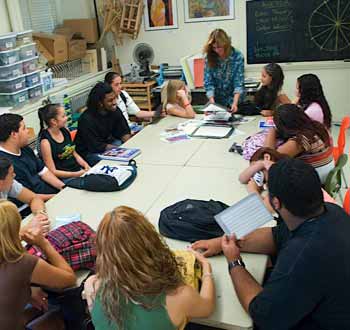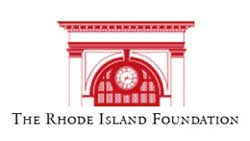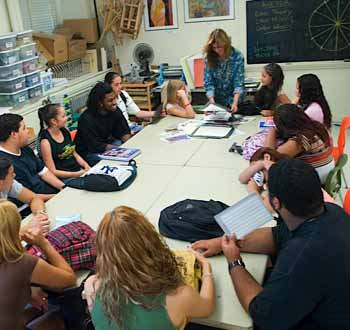 CENTRAL FALLS, R.I. – February 11, 2008 — At a gathering this morning at Central Falls High School, The Rhode Island Foundation joined with the University of Rhode Island and school leaders to announce their support of the Central Falls High School: University of Rhode Island Academy.
CENTRAL FALLS, R.I. – February 11, 2008 — At a gathering this morning at Central Falls High School, The Rhode Island Foundation joined with the University of Rhode Island and school leaders to announce their support of the Central Falls High School: University of Rhode Island Academy.
The Foundation has awarded the Central Falls High School: A University of Rhode Island Academy more than $175,000 to support the partnership’s efforts to transition from a failing school to one that will be a recognized, high-performing school of distinction. The grant supports work planned for the first year of a three-year program. An additional planning grant of $50,000 was awarded in 2007.
“It is important to us that we have added the Rhode Island Foundation as a partner embracing a shared vision for the high school’s future. Together, we can create an environment of creativity and imagination in which all students will gain the academic and personal skills required for a productive and satisfying life,” said URI President Robert L. Carothers.
The Foundation’s grant will support three of the Partnership’s innovative initiatives to create: the Academic Enhancement Center, the Family and Community Engagement Center and the Transition through Arts Literacy Learning (TALL) University.
The Rhode Island Foundation Chairman and Acting President George Graboys noted, “This is a project that offers real hope through a specific course of action – it is just the kind of collaborative model we are increasingly committed to support. What we learn in Central Falls should prove critical to improving the quality of education in public high schools throughout the state. That is why we are so invested in the Partnership’s success.”
 “This grant greatly supports the deepening of the partnership. It provides for peer models as tutors in the content areas, which will raise the expectations for a college future; it builds community capacity through outreach support to parents; and it brings an exciting expansion of innovative teaching strategies through the arts to a varied number of teachers district wide,” said Central Falls Superintendent Frances Gallo. “The Rhode Island Foundation’s gift will allow the URI:CF Partnership to grow secure roots of trust and support in order to stand firm for some time to come.”
“This grant greatly supports the deepening of the partnership. It provides for peer models as tutors in the content areas, which will raise the expectations for a college future; it builds community capacity through outreach support to parents; and it brings an exciting expansion of innovative teaching strategies through the arts to a varied number of teachers district wide,” said Central Falls Superintendent Frances Gallo. “The Rhode Island Foundation’s gift will allow the URI:CF Partnership to grow secure roots of trust and support in order to stand firm for some time to come.”
The Academic Enhancement Center will be modeled after the university’s primary learning assistance center that helps students develop the awareness, skills and strategies to improve their academic performance. At Central Falls, the Center will provide a space for skills building and tutoring support, as these services are vital for improving academic performance. A space dedicated to individual support and small group work has been identified adjacent to the library and a proposed computer center at the Academic Enhancement Center. The grant will fund 15 computers and related academic resources.
Through the partnership, the Family and Community Engagement Center will expand the resources and services for engagement with parents, family and community members in the academic support efforts at the high school. The Center will add 10 school/home outreach workers and other resources to its current staff of home/school liaisons to develop an aggressive, community-wide, and comprehensive array of educational opportunities and social services to parents and community members.
The innovative Transition through Arts Literacy Learning (TALL) project is designed to accelerate acquisition of English language skills for Central Falls English Language Learners and addresses students’ English language proficiency through a variety of special events and activities. At Central Falls, 25 percent of students are English Language Learners, the highest percentage of any school district in the state. The district-wide TALL University project bridges the gap between limited language skills and learning by using teaching tools that integrate course content with the performing arts.
About the Partnership
The University of Rhode Island began working with leaders from the state Department of Education and the Central Falls community last year in response to the high school’s classification for five consecutive years as a school “making insufficient progress,” as defined by the No Child Left Behind (NCLB) federal statute.
The formal partnership between the University and the Central Fall School District became official in May 2007. The overall goal of the partnership is that Central Falls High School: A University of Rhode Island Academy will be a recognized high-achieving school of distinction under NCLB guidelines within four years.
During the summer, teams of URI and Central Falls faculty worked together in professional development planning sessions. Just before classes began in late August, Central Falls’ students attended leadership development and other workshops to foster better student-teacher-community relationships in the new school year.
The year began with a new theme: T.E.A.M. (The Excellent Attitude Movement). This was seen as a first step in recreating a positive school climate and clarifying student expectations with an emphasis on three values: respect, responsibility and relationships.
The ongoing partnership has outlined plans that address the diverse needs of urban students by implementing personalization strategies and non-traditional, innovative, academic support systems to ensure all students have the opportunity to demonstrate proficiency in literacy, numeracy, technology, and other critical skill areas.
These plans call for the innovative restructuring of the high school into six distinct learning academies. The academies will allow learning to take place in small and distinctly supportive learning communities that provide students with opportunities to learn core subject matter in more experientially engaging settings. Students’ involvement in the academies would begin after successful completion of their initial core academic program, traditionally ninth and tenth grades. Through this process, learning is transformed from the theoretical to the practical.
The ultimate vision of the partnership is to ensure that all students graduate, demonstrating proficiency across rigorous academic and social standards, attain a meaningful diploma that opens doors to higher education and career development, and become productive citizens in the 21st Century.
The proposed six academies include: Teacher and Leadership; Science, Technology, Engineering and Mathematics (STEM); Hospitality; Law and Justice; Visual and Performing Arts; and Health Services. While the first four of these academies would be located in the traditional high school building, the Visual and Performing Arts and the Health Services academies will each have separate facilities. Plans are also being developed to address the distinct needs of students with disabilities and English Language Learners.
Melanie Coon, Rhode Island Foundation 401-274-4564

